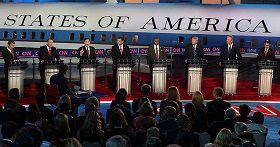 Watching the candidates running for President, I’m reminded of three communications lessons:
Watching the candidates running for President, I’m reminded of three communications lessons:
Communications lesson #1: By all means, be careful what you say, but say something
Regardless of what we think about Donald Trump and Bernie Sanders, they are people who have been perceived by many as “telling it like it is.” Their popularity represents a backlash against pandering political professionals who choose their words so carefully as not to offend the largest possible voter base. Such politicians make us wonder who they really are.
Similarly, when a company wants to burnish its image, it might support a cause or take a stand on issues having to do with consumer rights, environmental correctness, needed regulatory or legislative reform. But, like the career politicians, some companies actually stand for something of value while others merely go through the motions.
It’s possible to both say something meaningful and avoid alienating customers. If you’re too careful, you risk losing the people you’re trying to reach through apathy or mistrust.
Communications lesson #2: Do you know the person you’re trying to convince?
Since the advent of such things as social media, reality TV and “screaming heads”, we’ve gotten used to everyone expressing their own opinions in a no-holds-barred style. As a result, there may be more of a tendency to talk at people than to talk with people.
Astute politicians don’t just pay lip service to what voters want, they read the minds of the voters and speak to their needs and concerns. Sometimes, rightly or wrongly, they appeal to voters’ fears.
Likewise, the most effective CEOs or salespeople don’t push their agenda without an awareness of how their customers, investors, partners or employees’ may actually think and feel.
Addressing the mindset of the people you want to reach can be critical to establishing goodwill, getting the ear of an influencer, or making a sale.
Communications lesson #3: Entertainment can enhance a brand when it’s relevant
Donald Trump describes himself as an entertainer. No doubt his dramatic statements played a part in drawing an unprecedented almost 23 million viewers to the second GOP Presidential debate on CNN. But showmanship will only take him so far.
PR professionals, too, have found ways to amuse in order to attract attention. Many have embraced “storytelling” as a way of engaging their clients’ customers through social media as well as through other, more traditional media venues. Corporate marketers often leverage the power of sports, movie and music icons.
The use of entertainment should be synergistic with a company’s brand. If there’s a disconnect, the brand won’t benefit, or, worse, the attempt to engage will look like an act of desperation.
-Ann Pinkerton
Image via Flickr account Peter Stevens
